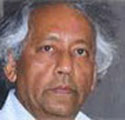Ignorance & Decline

By Irfan Husain
February 21st, 2015
“The meek shall inherit the earth”, goes the Biblical saying (Matthew 5:5). “But the rich shall retain the mineral rights” added a cynic.
The later version has proved to be truer than the original, especially in the colonial period of the 19th and 20th centuries. This era witnessed a ruthless competition for lands and resources in Africa and Asia between Western states. From Japan to Turkey, predatory banks and greedy traders, supported by their states, destroyed local industries and institutions and captured markets.
It took a long time for the colonised nations to recover from this sudden loss of power and sovereignty — indeed, many are still psychologically enslaved. But this powerful colonial thrust also evoked a counter-narrative from the colonised. This is the subject of Pankaj Mishra’s erudite and lucid book From the Ruins of Empire.
Afghani consistently opposed imperialism.
Among these voices, none were as compelling as Jamaluddin al-Afghani’s. Articulating his vision of a pan-Islamic resistance to imperialism, he wrote in a letter to the Ottoman sultan in 1892 that Western powers “all have one desire, that of making our land disappear up to our last trace. And in this there is no distinction to make between Russia, England, Germany or France, especially if they perceive our weakness and our impotence…. If, on the contrary, we are united, if the Muslims are a single man, we can then be of harm and of use, and our voice will be heard.”
Throughout his peripatetic life, pan-Islamism and anti-imperialism were the major themes in his speeches and writings. Apart from appealing to Muslims, he also attracted Jewish and Christian followers due to his stance against foreign dominance.
Despite his name, Afghani was actually born in a Shia family in Persia, and educated in Tehran before going to a famous seminary in Najaf, and then to India. In order to reach a wider Muslim audience, he adopted his Afghan persona; indeed, his supposed remains were laid to rest in Kabul after lying in an unmarked grave in Istanbul for years. The Afghans now claim him as their own.
After witnessing India’s plight under the British yoke, Afghani concluded that without changing their ways, colonised people could never free themselves. In an unsparing speech in a Turkish seminary in 1870, he said:
“My brothers, arise from the sleep of neglect. Know that the Islamic people were once the strongest in rank…. Later this people sank into ease and laziness…. Some of the Islamic nations came under the domination of some nations. The clothes of abasement were put on them. The glorious milla was humiliated. All these things happened from lack of vigilance, laziness, working too little and stupidity.…”
Speaking eight languages, Afghani travelled incessantly, lecturing to students, scholars as well as shahs, preaching unity, education and modernism. Some of his words came dangerously close to heresy, and he often changed his message to suit the audience. But he was consistent in his opposition to imperialism.
Apart from trying to influence the rulers of Persia, Egypt and the Ottoman Empire, he travelled to Moscow, Paris and London to urge leaders there to form alliances with Muslim states. But in the end, he only alarmed them with his radicalism.
For his time, he was remarkably progressive. Arguably, the Islamic world — due largely to retrogressive ideas from Saudi Arabia — has become more close-minded than it was a century ago.
In a speech in Alexandria, he spoke of women’s rights, declaring it “impossible to emerge from stupidity, from the prison of humiliation … as long as women are deprived of rights and ignorant of their duties, for they are the mothers from whom will come elementary education and primary morality.…”
In a scathing analysis in 1879, Afghani wrote: “O, sons of the East, don’t you know that the power of the Westerners and their domination over you came through their advance in learning and education, and your decline in these domains?”
In another article, he went on to attack despotism in the Islamic world, specifically the backward interpretation of Islam imposed by the Ottomans that had prevented Muslims from internalising modern education. This, according to Afghani, had permitted Europeans to overtake and subjugate Muslims.
In India, he took a position against Sir Syed Ahmed Khan for advocating that Indian Muslims should make themselves useful to the British by acquiring a Western education. But he was just as opposed to Indian ulema for their backwardness. In an article addressed to them, he asked:
“Why do you not raise your eyes from your defective books and cast your glance on this wide world.… You spend no thought on this question of great importance, incumbent on every intelligent man, which is: what is the cause of the poverty, indigence, helplessness and distress of the Muslims, and is there a cure for this … great misfortune or not?”
One hundred and eighteen years after his death, this question remains unanswered.
Source: http://www.dawn.com/news/1164919/ignorance-decline




 Moderate Islamist here
Moderate Islamist here


0 comments:
Post a Comment